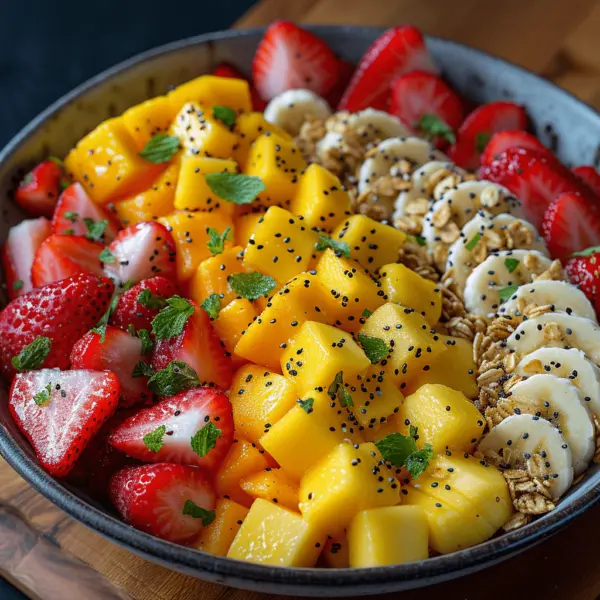Welcome to the Mango Magic adventure! Discover how this tropical delight can not only tantalize your taste buds but also enhance your athletic performance.
Mango Magic
Health Benefits:
Rich in Vitamins: Mangoes are a powerhouse of essential vitamins, including Vitamin C, Vitamin A, and Vitamin E, promoting a strong immune system.
Digestive Health: Packed with fiber, mangoes aid digestion, prevent constipation, and promote a healthy digestive tract.
Eye Health: The high levels of Vitamin A in mangoes contribute to good eyesight and prevent age-related macular degeneration.
Anti-Inflammatory Properties: Mangoes contain antioxidants that help reduce inflammation, providing relief from conditions like arthritis.
Athletic Performance:
Natural Energy Boost: The natural sugars in mangoes provide a quick energy boost, making them an excellent pre-workout snack.
Electrolyte Balance: Mangoes are a good source of potassium and magnesium, aiding in maintaining electrolyte balance during intense physical activity.
Muscle Recovery: The presence of enzymes like amylases supports muscle recovery by aiding in the breakdown of carbohydrates.
Ways to Enjoy Mangoes:
1. Mango Smoothie:
Blend mango chunks with yogurt, ice, and a splash of coconut water for a refreshing and nutritious smoothie.
2. Mango Salsa:
Dice mangoes and mix with tomatoes, onions, cilantro, and lime juice for a zesty salsa. Perfect as a topping for grilled proteins or a side dish.
3. Mango Sorbet:
Freeze mango puree with a touch of lime for a delightful and healthy sorbet. A guilt-free treat for post-workout indulgence.
4. Mango Salad:
Combine mango slices with mixed greens, avocado, and grilled chicken for a vibrant and nutrient-packed salad.
5. Mango Chia Pudding:
Create a nutritious dessert or breakfast by layering mango puree with chia seeds. Allow it to set for a delicious and energy-boosting treat.

Nutritional Information
| Nutrient | Amount per 100g |
|---|---|
| Calories | 60 |
| Carbohydrates | 15g |
| Fiber | 1.6g |
| Sugars | 13.7g |
| Vitamin C | 36.4mg |
| Vitamin A | 54µg |
| Vitamin E | 0.9mg |
| Potassium | 168mg |
| Magnesium | 9mg |
Values are approximate and may vary based on mango variety and ripeness.
FAQs
Q: Are mangoes good for weight loss? A: Yes, mangoes can aid weight loss due to their fiber content, promoting a feeling of fullness.
Q: Can mangoes be consumed by diabetics? A: In moderation, yes. The fiber in mangoes helps regulate blood sugar levels.
Q: How do I know if a mango is ripe? A: A ripe mango will have a fruity aroma near the stem and yield slightly to gentle pressure.
Mango and Health Concerns
Mango and Sugar Content:
While mangoes are high in natural sugars, they are also rich in fiber, which helps moderate blood sugar levels. Enjoying mangoes in reasonable portions can be part of a balanced diet.
Mango and Cholesterol:
Mangoes can be beneficial for cholesterol levels. They contain pectin, a type of soluble fiber that helps lower LDL (bad) cholesterol. Including mangoes in your diet can contribute to heart health.
Mango for the Elderly:
Mangoes are excellent for the elderly due to their high vitamin and mineral content. They aid digestion, support eye health, and boost immunity, making them a great addition to an elderly person’s diet.
Mango and Acid Reflux:
Mangoes are low in acid and can be enjoyed by those with acid reflux in moderation. Their high fiber content can help with digestion, but it’s important to monitor individual reactions.
Mango as an Anti-Inflammatory Food:
Mangoes have anti-inflammatory properties due to their high levels of antioxidants, which can help reduce inflammation and provide relief from conditions like arthritis.
Mango Consumption Tips
Soaking Mangoes:
Soaking mangoes in water for a few hours before eating can help reduce their heat-producing properties, making them easier to digest and more refreshing, especially during hot weather.
Eating Mango Skin:
While the skin of a mango is edible, it can be tough and bitter. Most people prefer to peel the skin off before consuming the fruit. If you decide to eat the skin, ensure the mango is thoroughly washed.
Enjoying Raw Mango:
Raw mangoes, known for their tangy taste, are not only delicious but also packed with nutrients. They can be enjoyed in various forms, such as in salads, chutneys, or simply sprinkled with salt and chili powder.
Eating Mango at Night:
Eating mangoes at night is generally fine, as long as they are consumed in moderation. Their natural sugars can provide a mild energy boost, but overeating may cause discomfort.
Eating Mango on an Empty Stomach:
Eating mango on an empty stomach can be beneficial as it allows the body to fully absorb the nutrients. It can also provide a quick energy boost to start your day.
Storing Cut Mango:
You can cut a mango and store it in the refrigerator for up to 24 hours. Ensure it’s kept in an airtight container to maintain freshness and prevent oxidation.
Digesting Raw Mango:
Raw mangoes generally take a few hours to digest. Their high fiber content aids in digestion, but it’s best to consume them in moderation to avoid any digestive discomfort.
How to Choose and Pair Mangoes
Identifying a Ripe Mango:
A ripe mango will have a fruity aroma near the stem, a slight give when gently squeezed, and vibrant, even coloring. Avoid mangoes with excessive wrinkles or blemishes. The color of a ripe mango can vary depending on the variety but generally includes shades of red, yellow, and orange.
What Pairs Well with Mango:
Mangoes pair well with a variety of foods. Try combining them with coconut, lime, avocado, yogurt, or mint for delicious and complementary flavors.
.